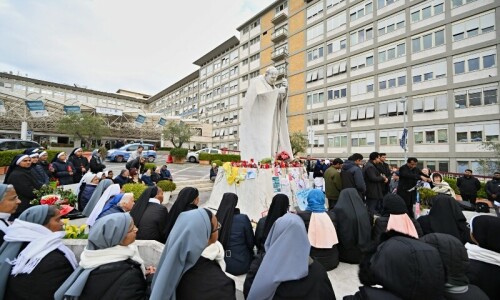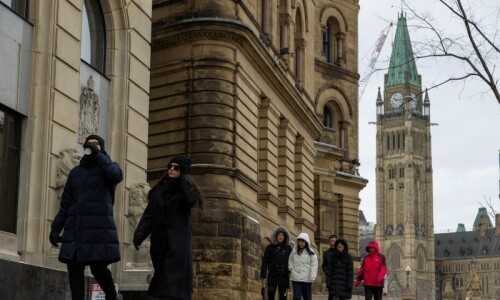PM solicits world support for new Afghan rulers

• Addresses UNGA session via video link
• Urges pressure on India for resolution of Kashmir dispute
• Asks UN to convene a global dialogue on countering Islamophobia
ISLAMABAD: Prime Minister Imran Khan on Friday made a strong pitch for the world to rally behind Afghanistan’s nascent Taliban government for preserving the progress made by the war-ravaged country over the past two decades and preventing it from turning into a safe haven for terrorists.
Speaking at the 76th session of the United Nations General Assembly via video link, Mr Khan said: “There is only one way to go. We must strengthen and stabilise the current government, for the sake of the people of Afghanistan.”
He warned that taking a course contrary to this would further destabilise the war-torn country and turn it into a terrorists’ haven.
Since the Taliban takeover of Kabul, Pakistan has consistently called for recognition of the new Taliban government, assistance for averting the looming humanitarian crisis in Afghanistan, and resumption of development aid for the new administration for preventing an imminent economic collapse there. This has dominated Pakistan’s foreign policy agenda for the past few weeks.
Most of the Western countries have expressed interest in engaging the Taliban and promised humanitarian aid. But, they have been reluctant to formally recognise the group as the government in office in Afghanistan and provide development assistance that has historically funded the functioning of the state institutions there.
This reluctance has been fuelled by fears about human rights under the Taliban regime, especially those of women; lack of representation of other ethnicities, religious minorities, and women in the government; and concerns about resurgence of terrorist groups in Afghanistan that could threaten other countries.
Mr Khan, however, tried to dispel the perceptions about Taliban, saying they had promised to respect human rights, set up an inclusive government, and prevent terrorist groups from using their soil. He recalled that the Taliban had already announced amnesty for their opponents.
The prime minister, therefore, urged the world community to incentivise the Taliban to “walk this talk”.
With this happening, he said, it would be a win-win situation for everyone.
“If the world can incentivise them to go this direction, then after all this 20-year presence of the coalition forces in Afghanistan would not be wasted. Because the Afghan soil would not be used by the international terrorists,” he said, noting that it was a “critical time” for Afghanistan.
Resolution of Kashmir dispute
Prime Minister Khan called on the world community to take urgent steps for preventing a conflict between India and Pakistan by taking steps to resolve the longstanding Kashmir dispute.
“India’s military build-up, development of advanced nuclear weapons, and acquisition of destabilising conventional capabilities, can erode mutual deterrence between the two countries,” he said, pointing to the growing Hindu extremism in India that has become a threat for its Muslim population and those belonging to other religious minorities.
Pakistan, Mr Khan reiterated, wanted peace with India and earlier this year renewed the 2003 understanding on the LoC ceasefire out of hope that it could force a “strategic rethink” in Delhi. However, Indian provocative actions in occupied Kashmir and human rights violations there further vitiated the environment.
The prime minister emphasised that it was for India to create a conducive environment for “meaningful and result-oriented” engagement by reversing its unilateral and illegal measures taken since Aug 5, 2019; stopping oppression and human rights violations against the people of Kashmir; and halting and reversing the demographic changes in the occupied territory.
He recalled the deteriorating human rights situation in occupied Kashmir where Indian authorities have engaged in arbitrary detentions, extrajudicial killings and enforced disappearances, besides denying the people of the disputed region basic freedoms.
“We have unveiled a detailed dossier on gross and systematic violations of human rights by the Indian Security Forces in Occupied Jammu and Kashmir,” he added.
He also criticised the world for its silence on Indian actions in occupied Kashmir. “It is unfortunate, very unfortunate, that the world’s approach to violations of human rights lacks even-handedness, and even is selective. Geopolitical considerations, or corporate interests, commercial interests often compel major powers to overlook the transgressions of their ‘affiliated’ countries,” he maintained.
“Such double standards are the most glaring in case of India, where this RSS-BJP regime is being allowed to get away with human rights abuses with complete impunity,” he added and recalled the events surrounding the final rites of Kashmiri leader Syed Ali Shah Geelani, whose remains were forcibly taken away by the authorities and his family was denied a proper funeral and burial.
He demanded that Geelani’s mortal remains be allowed to be buried in the “cemetery of martyrs” with appropriate Islamic rites.
Challenges posed by Covid
The prime minister also drew the world’s attention to the triple challenges of Covid-19, the accompanying economic crisis, and the threats posed by climate change and called for formulating a comprehensive strategy under which vaccine equity is ensured; adequate financing is provided to developing countries; and clear investment strategies are adopted that help alleviate poverty, promote job creation, build sustainable infrastructure, and bridge the digital divide.
He called on the UN secretary-general to convene a summit in 2025 to review and accelerate implementation of Sustainable Development Goals (SDGs).
Mr Khan urged the world to deal properly with Islamophobia. “I call on the secretary-general to convene a global dialogue on countering the rise of Islamophobia. Our parallel efforts, at the same time, should be to promote interfaith harmony, and they should continue,” he said.
The prime minister also sought world’s help in retrieving the assets of poor countries stolen by their corrupt ruling elite and parked in banks abroad.
Published in Dawn, September 25th, 2021
















































